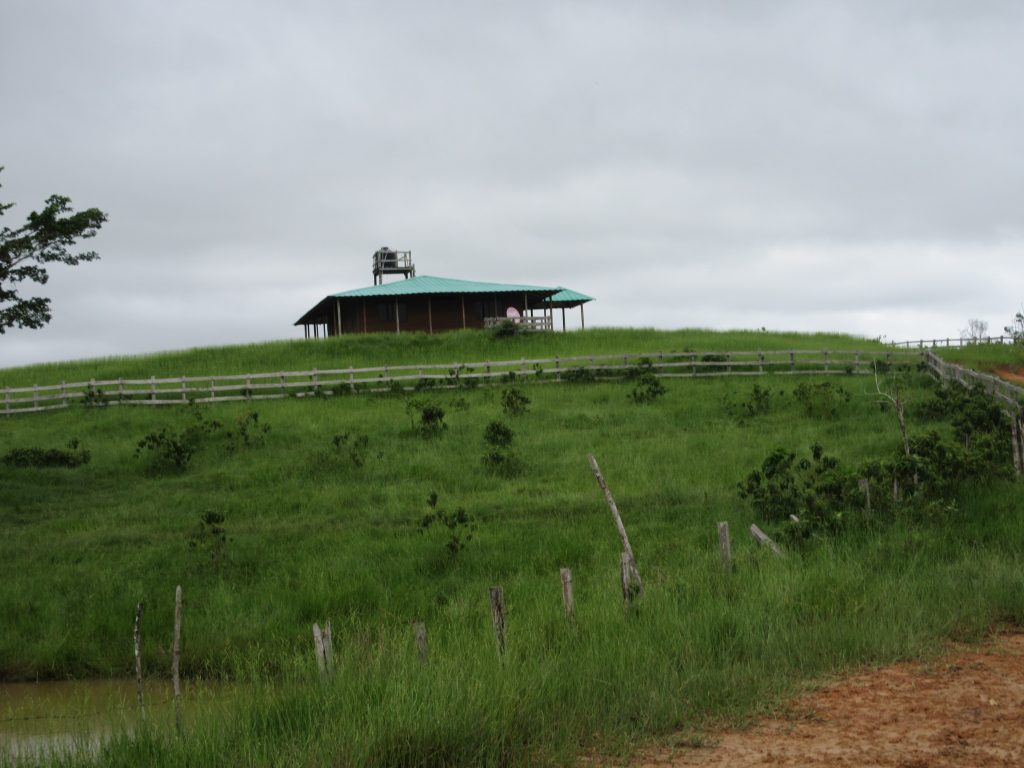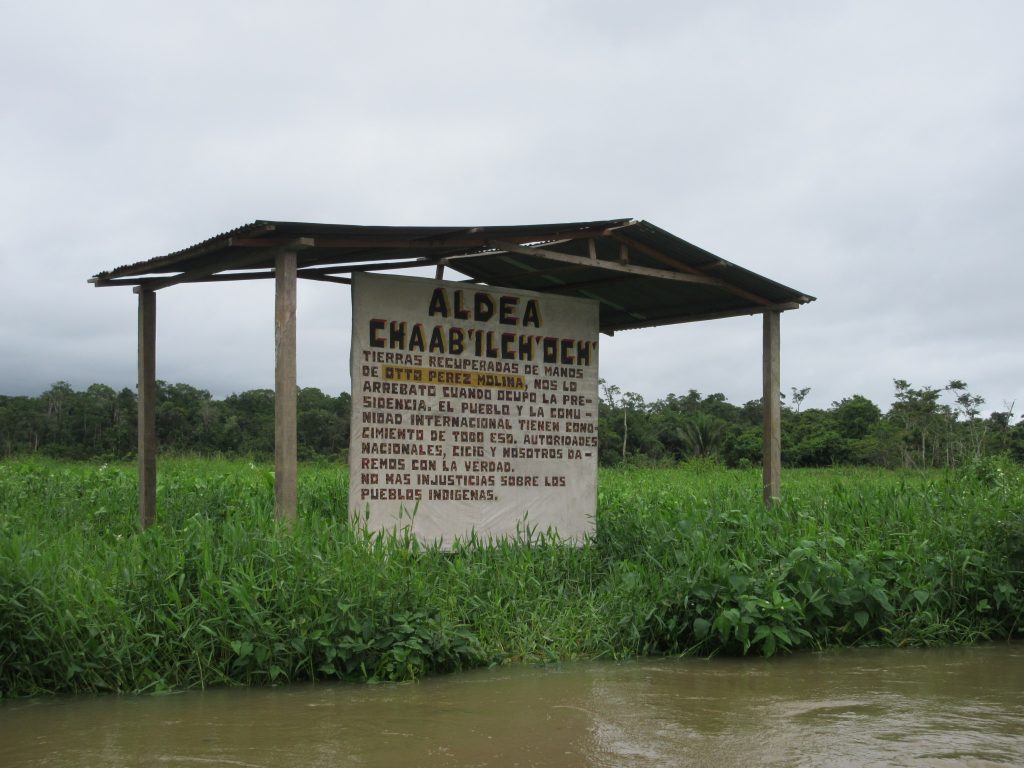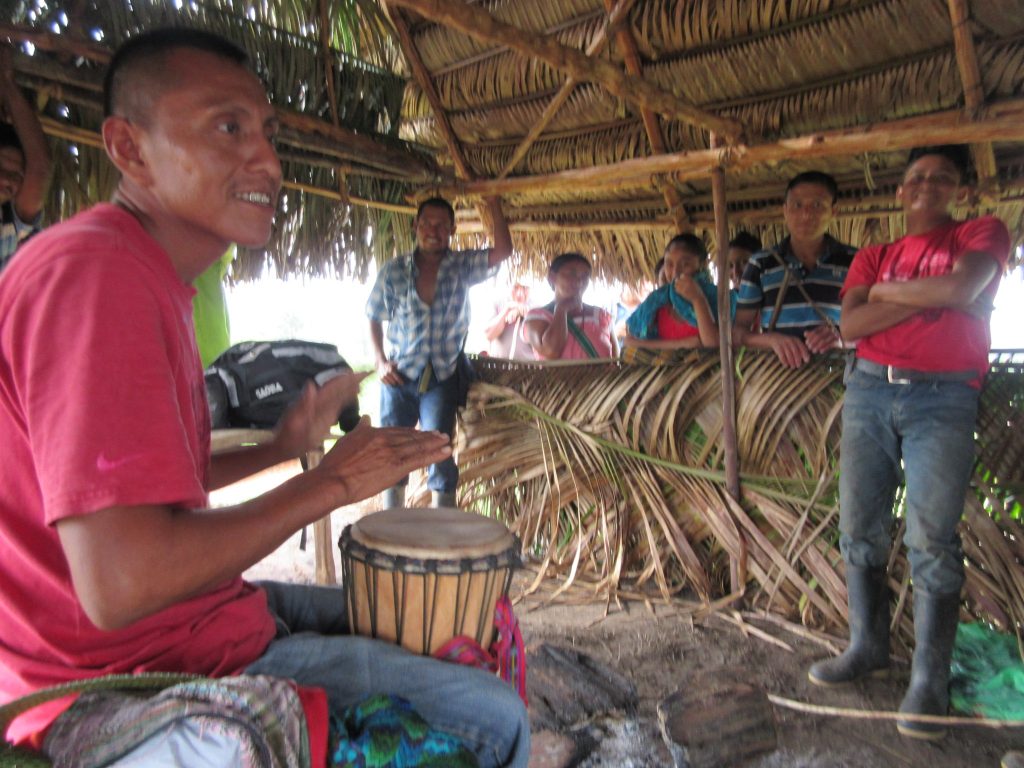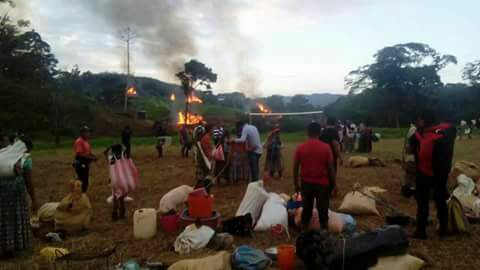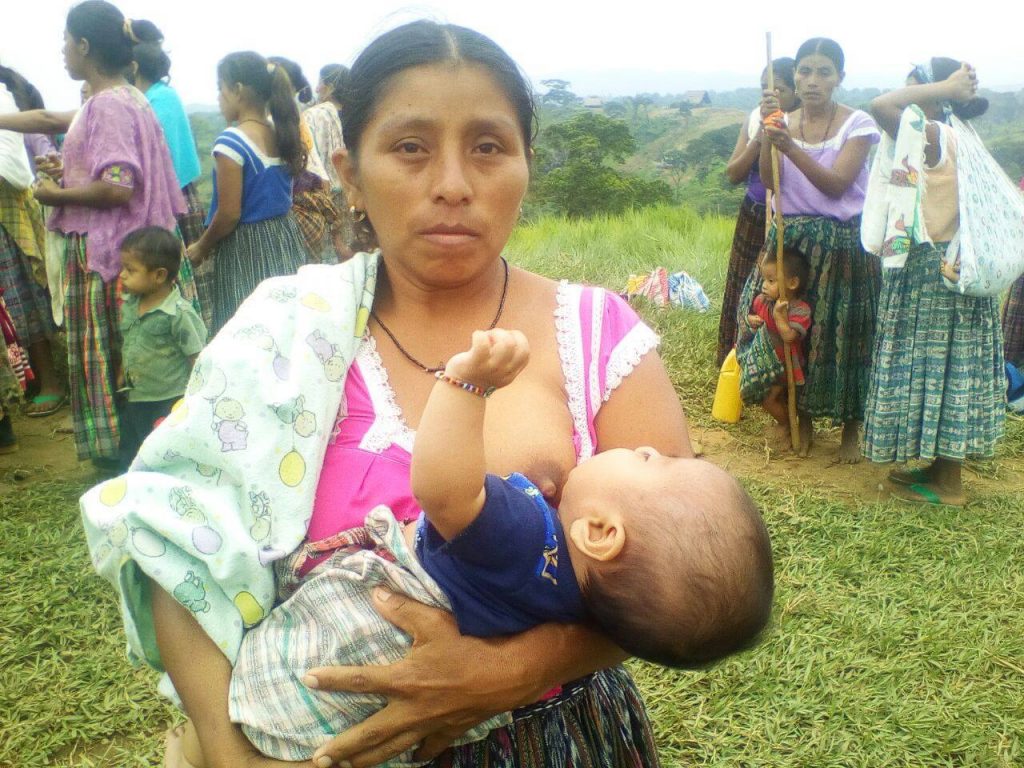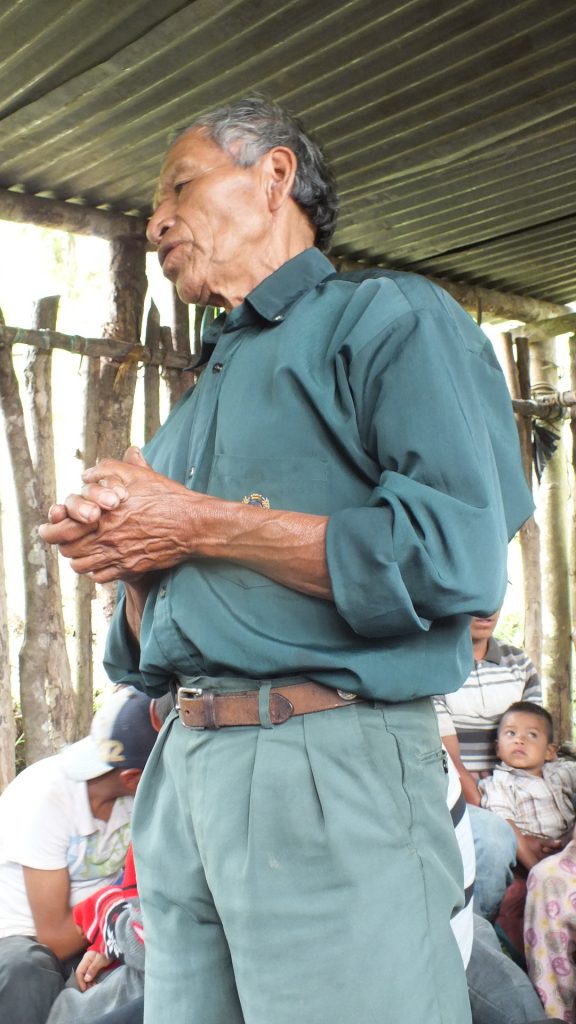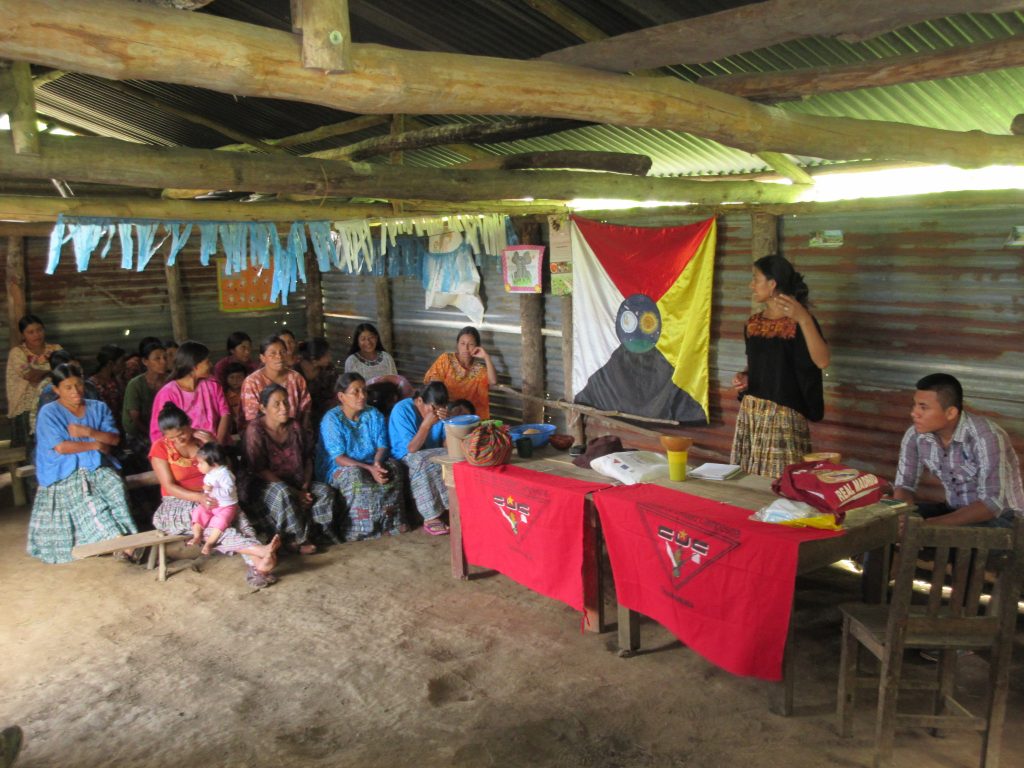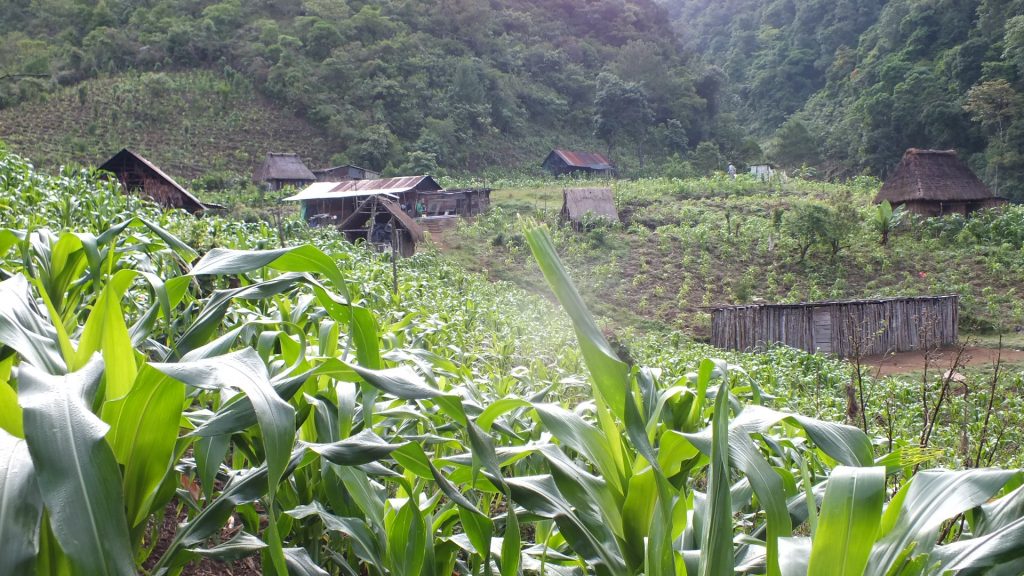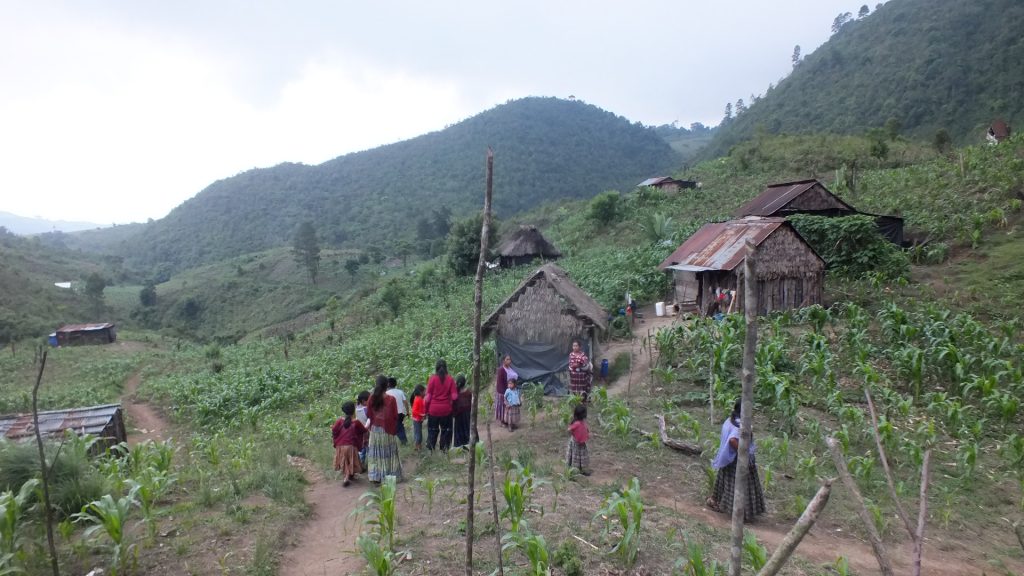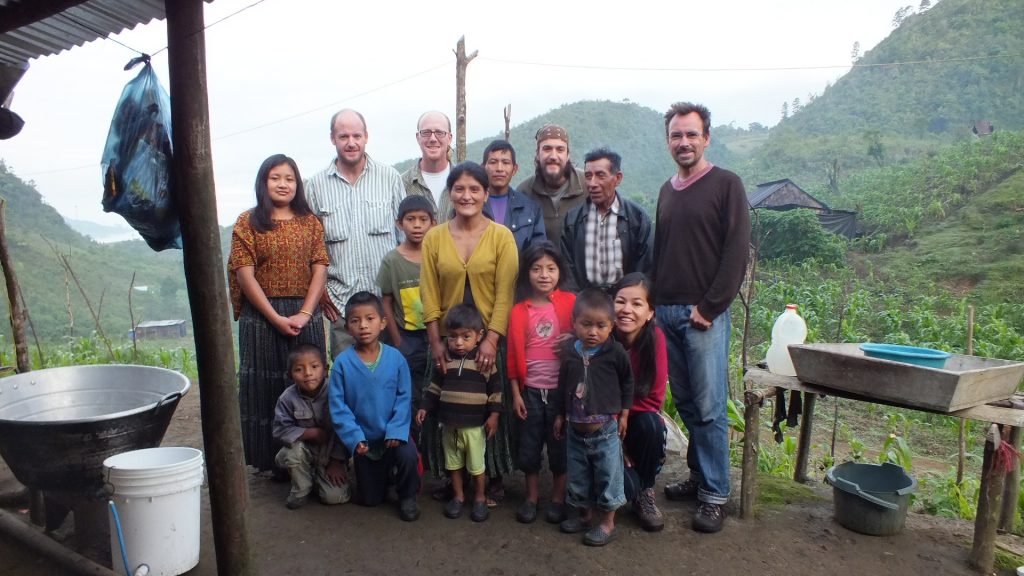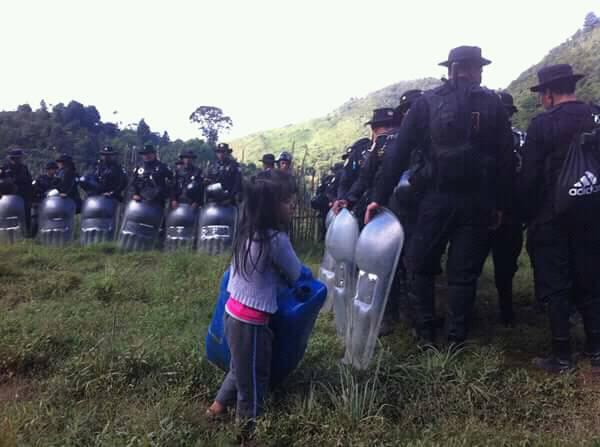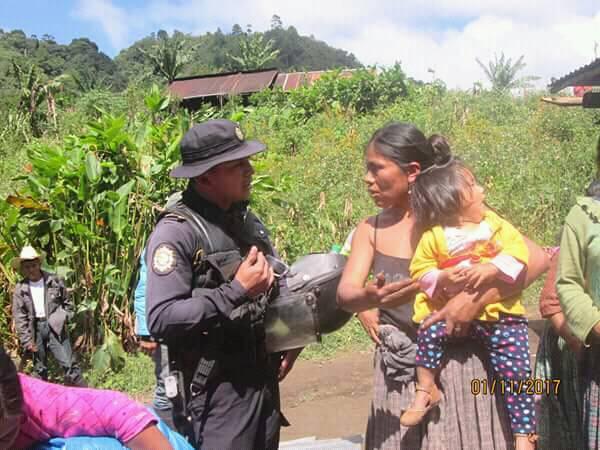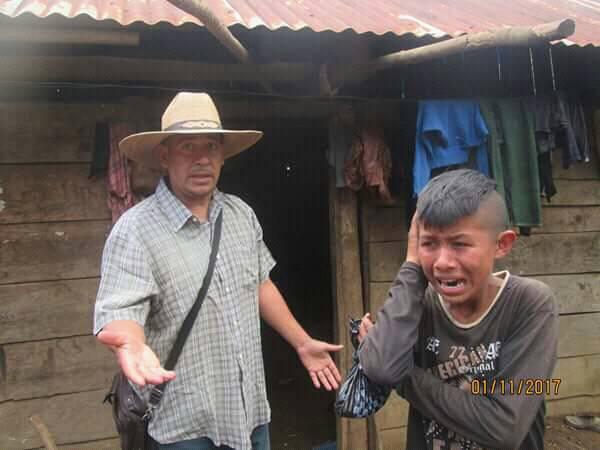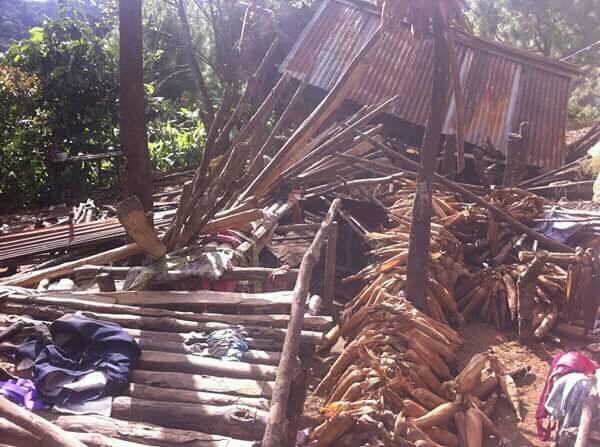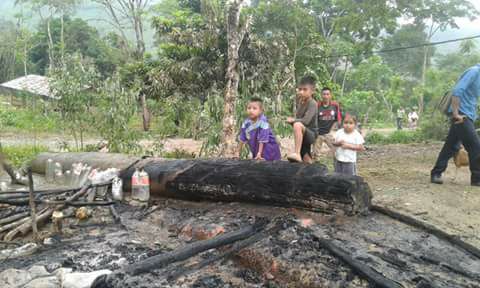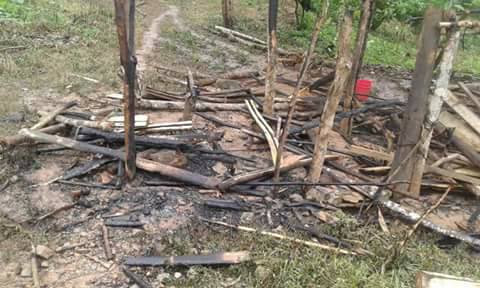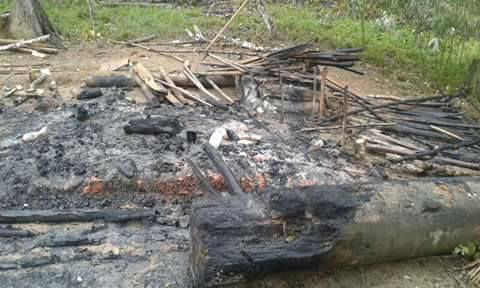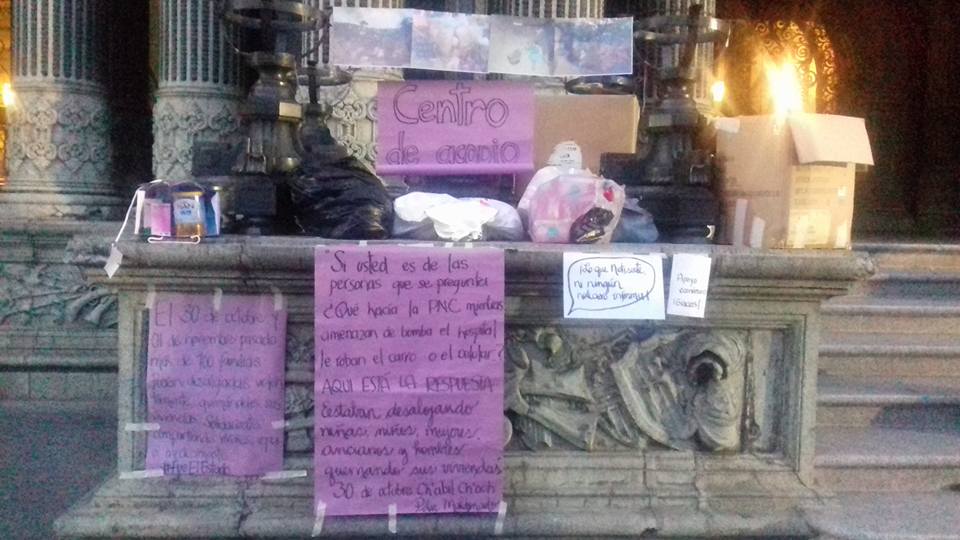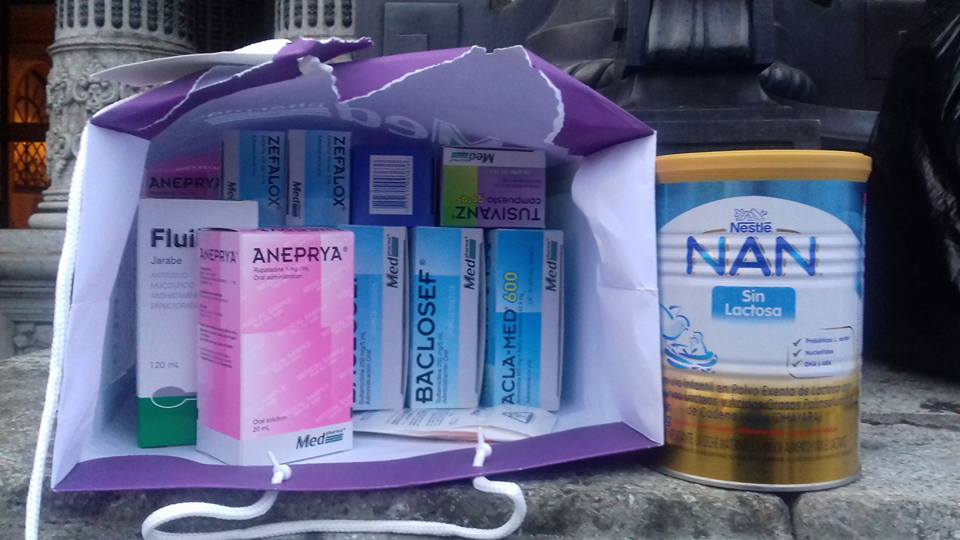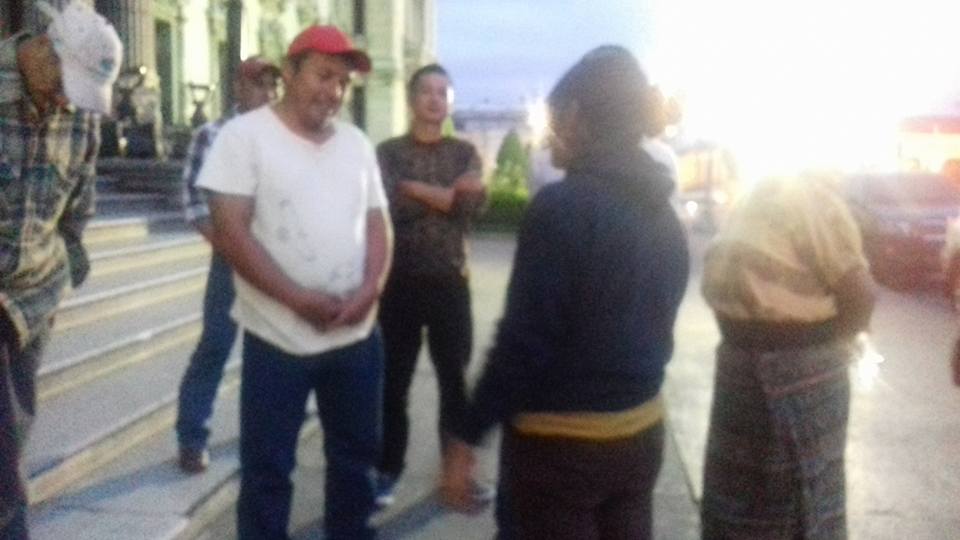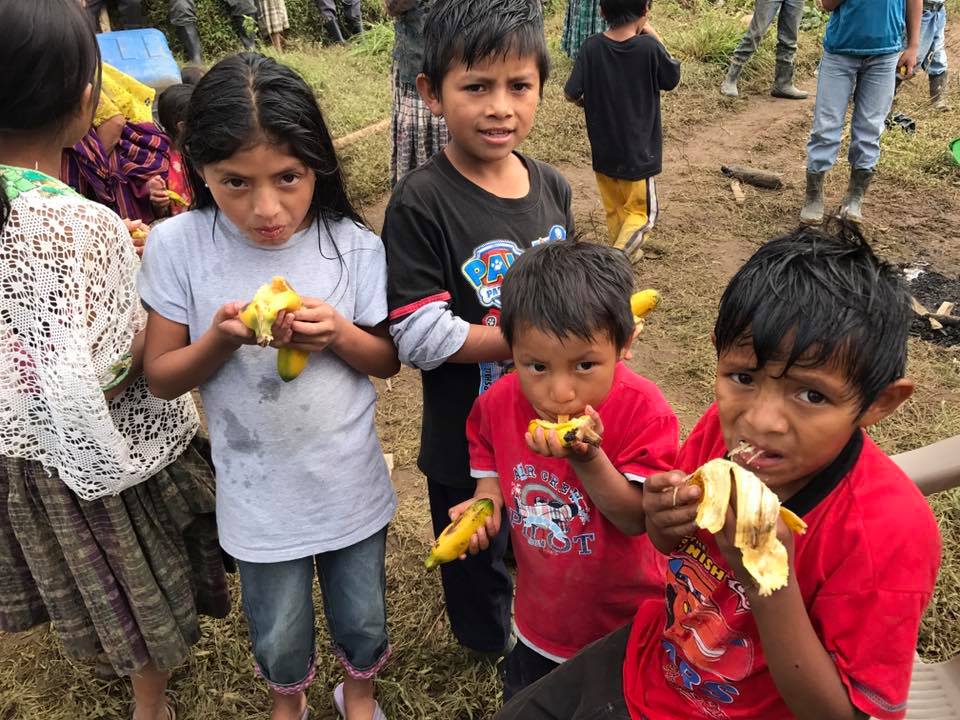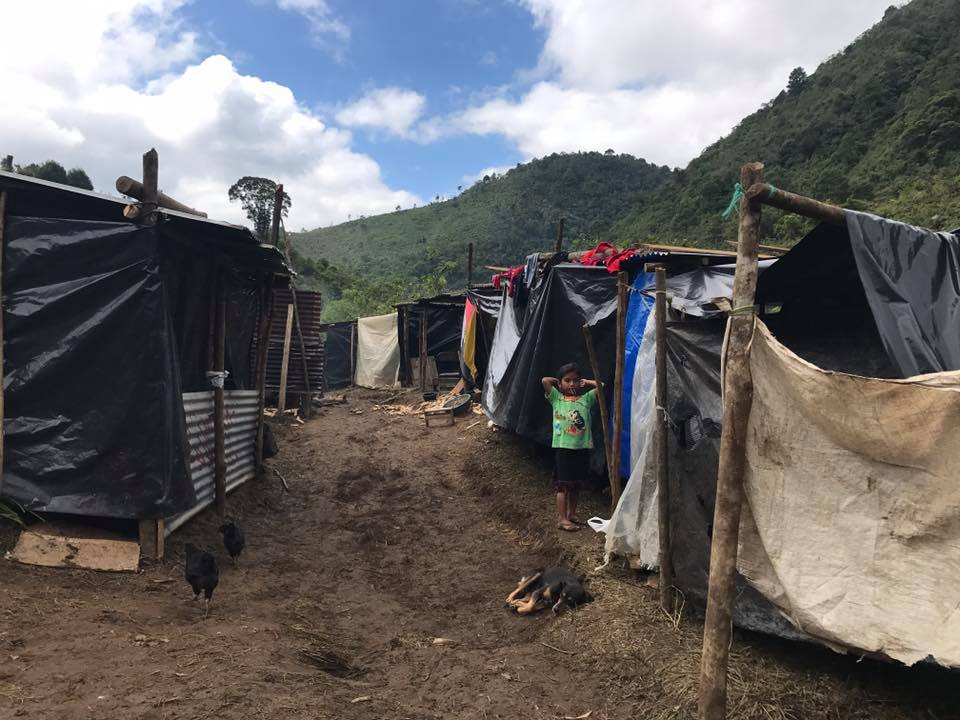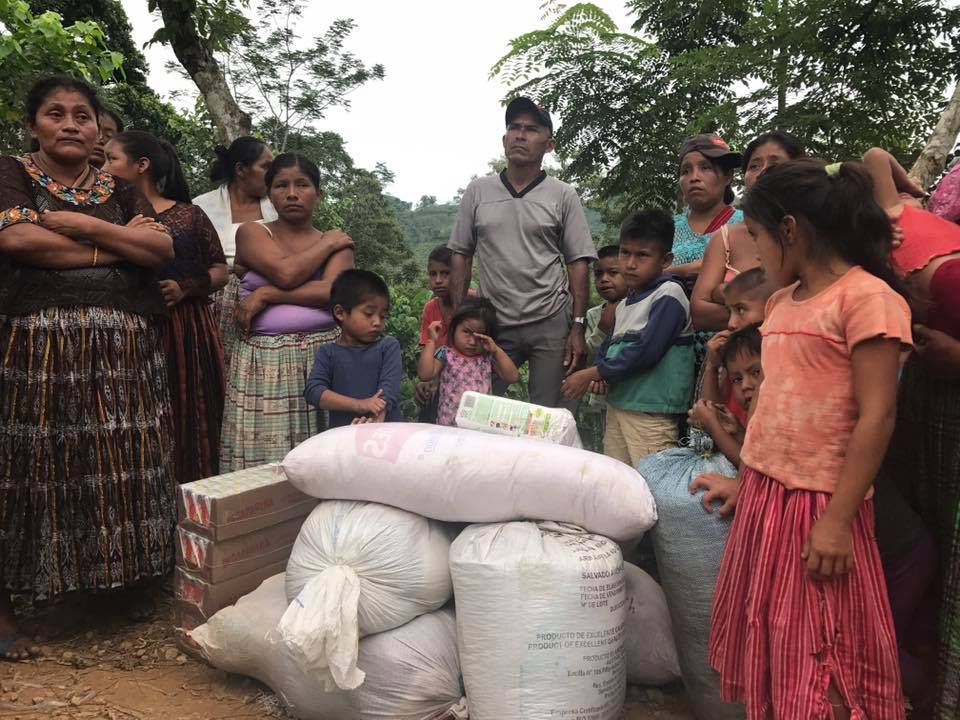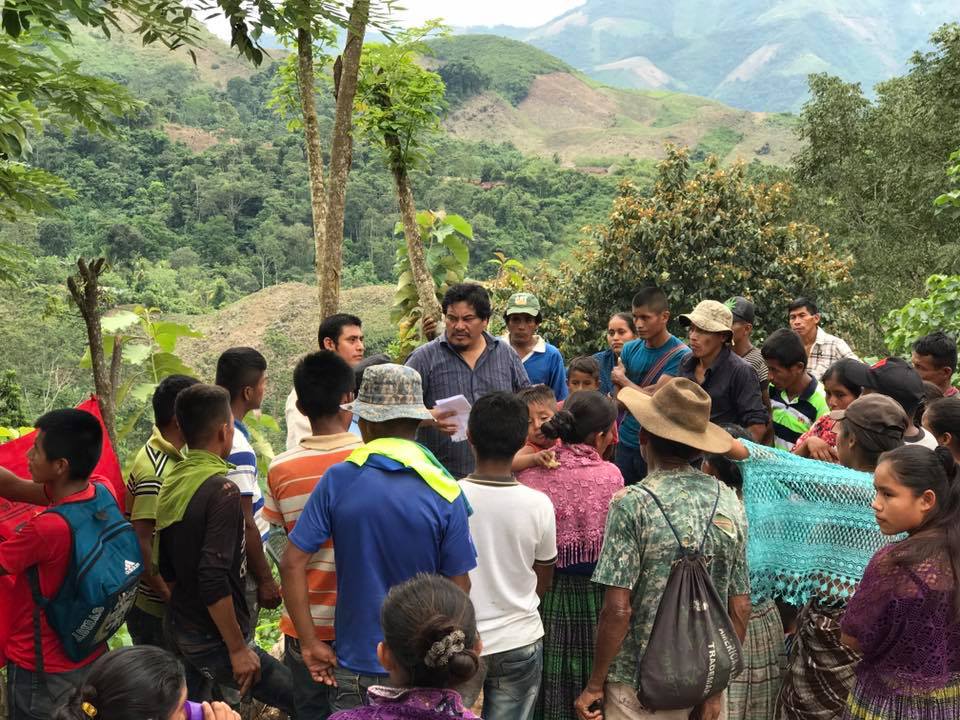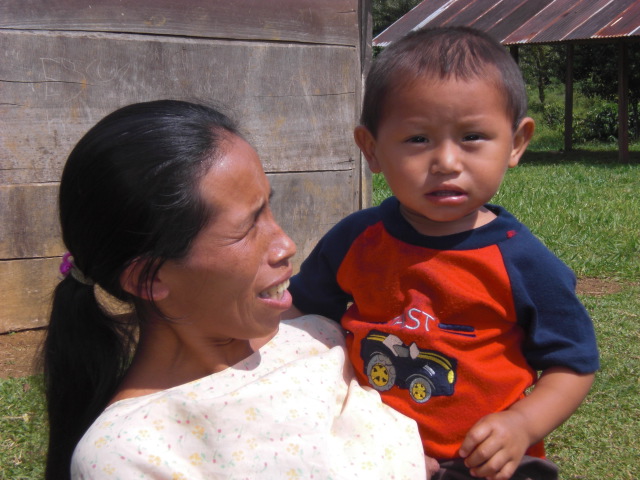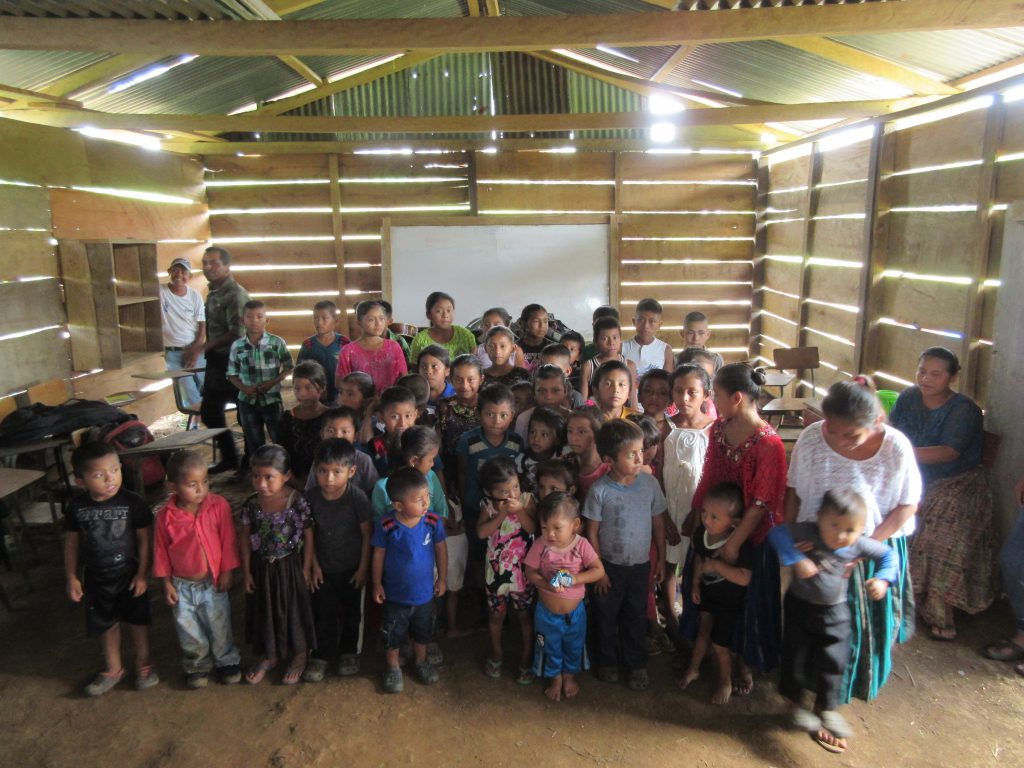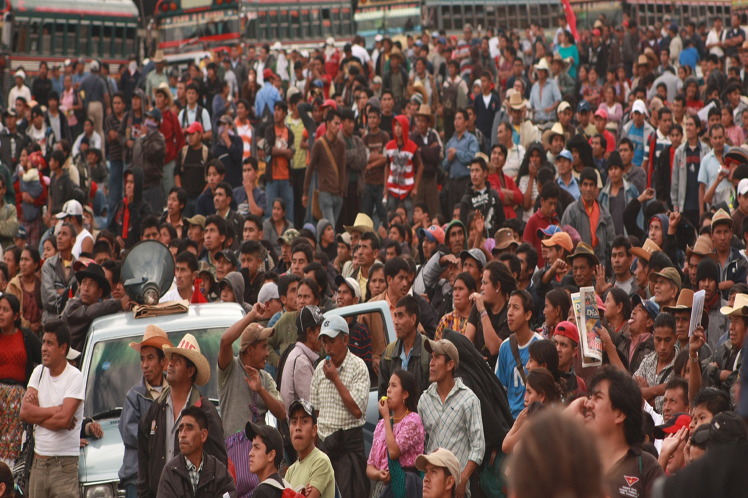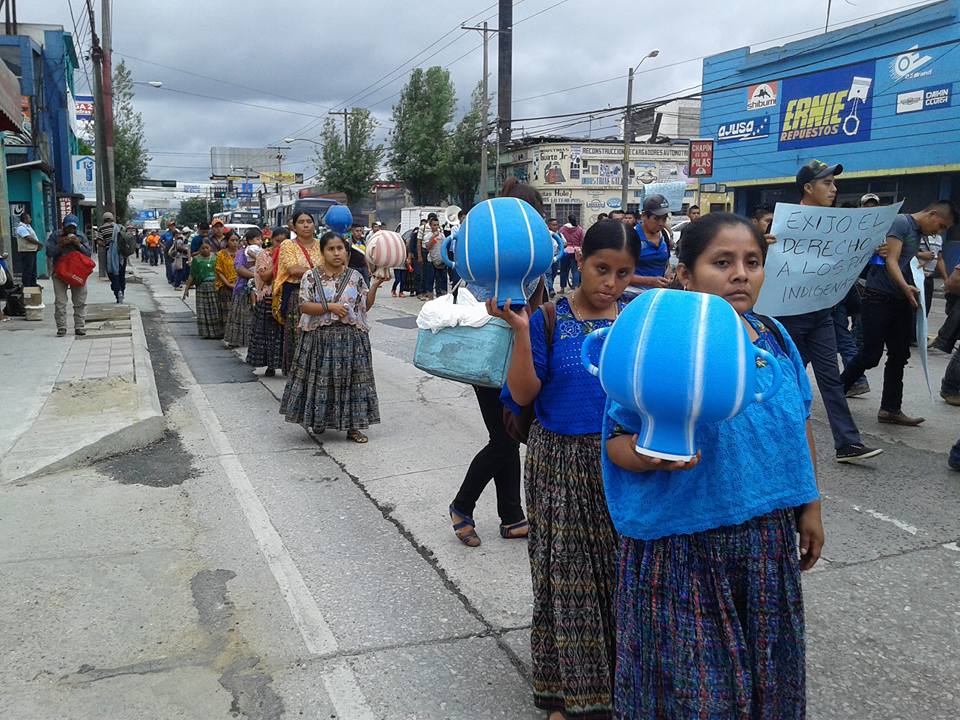November 12, 2017
Please consider making an urgently needed donation of $10 (or more)! More suggested actions at the bottom of this page
The GSP calls for urgent solidarity with indigenous communities in Guatemala as the government is currently mobilizing hundreds and possibly thousands of police to burn down fifteen villages. The threat comes less than two weeks after police burned homes and completely destroyed the indigenous communities Chaab’il Ch’och’, La Cumbre Sa’kuxha and Se’muy. The illegal violence caused acute hunger that continues today, but the communities have maintained an inspiring unity despite the crisis.
International solidarity has played a role in stopping violent evictions in the past, even in recent days. The GSP asks all people of conscious to unite with indigenous communities under threat. Suggested actions are at the bottom of this alert.
BACKGROUND INFORMATION:
October 31, 2017: Violent Eviction of Chaab’il Ch’och’
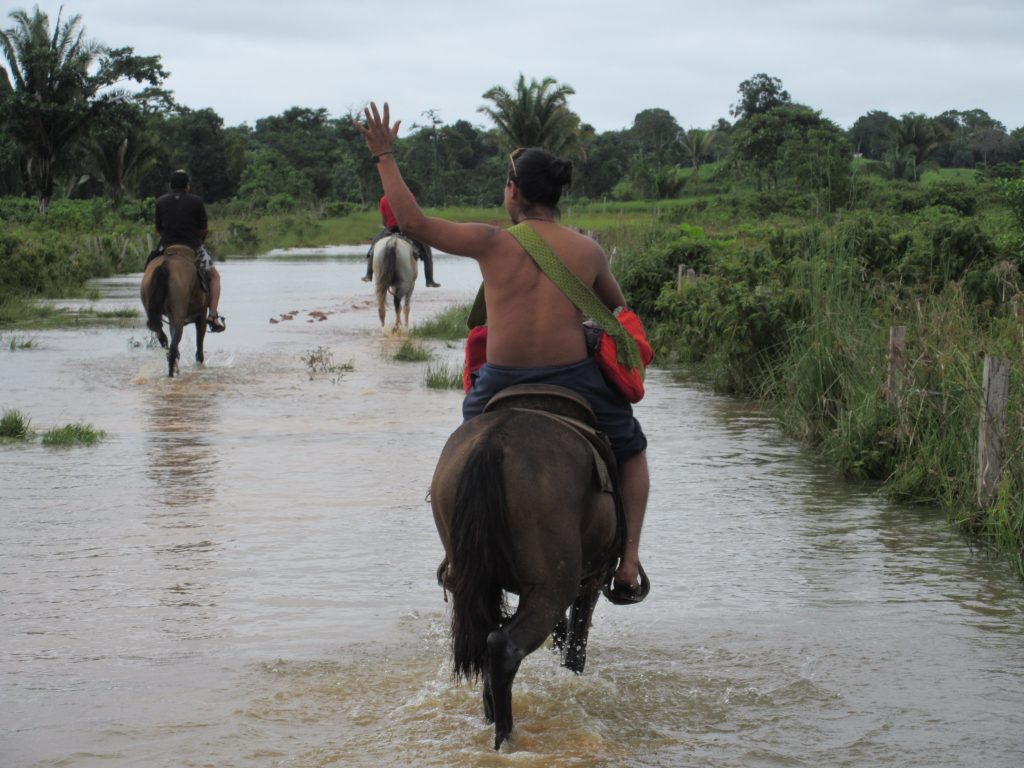
GSP activists ride horses into the community Chaab’il Ch’och’
In the 1930s, the community Chinamachacas (now known as Chaab’il Ch’och’), located in what is now the municipality of Livingston, department of Izabal, was created by hundreds of indigenous q’eqchi’ peasants fleeing extreme violence and slavery. At this time indigenous people in Guatemala were forced by law to either work on plantations or to work clearing roads and other infrastructure to facilitate the export of goods abroad. The largest landholder in Guatemala was the United Fruit Company, a US-based corporation. Other foreign private interests were looting indigenous communities throughout the q’eqchi’ territory of northeast Guatemala and converting them to coffee and other agro-export plantations.
Chinamachacas was located in the municipality of Livingston, department of Izabal, only a few feet above sea level and separated from urban areas by numerous rivers as well as the Gulf of Livingston. Because of the isolation and the fact that the area was consider uninhabitable by lighter skinned people, the community was able to continue to escape forced labor, and developed for decades based primarily on subsistence agriculture. The community extended for hundreds of acres and its people were among a minority of q’eqchi’ who were able to live outside the norm of forced labor on plantations. But residents of Chinamachacas were not able to escape the extending reach of capitalism, militarism and imperialism forever.
In 1944 a largely non-violent revolution overthrew US-backed dictator Jorge Ubico. Free elections were held for the first time, and the forced labor law for indigenous people was ended. The US used many methods to try to subvert Guatemalan democracy, and in 1954 the US Air Force bombed Guatemala City and installed a military dictatorship that in many ways has continued to this day.
Resistance to the military dictatorship was broad, and the US responded by increasing its direction and support of the Guatemalan military. Much of this violence was coordinated through the US Army School of the Americas, a US military school known for training dictators and leaders of massacres throughout the Western Hemisphere. This led to a three-decade long war in which the Guatemalan government intentionally targeted indigenous people, murdering hundreds of thousands of civilians in what the United Nations and many others have called acts of genocide. According to a 1997 UN Truth Commission the Guatemalan government used the US National Security Doctrine and US training and technology to torture and murder children, pregnant women and thousands of others as part of this genocide.
During the genocidal war, military officials stole enormous tracts of land from indigenous communities. For example General Romeo Lucas Garcia, a graduate of the US Army School of the Americas (SOA) and dictator of Guatemala from 1978 to 1982, became the owner of over 90,000 acres of land during his time as President. He is known for starting the “scorched earth policy” of massacring and burning down entire indigenous villages. He was followed by General Efrain Rios Montt, another SOA graduate who ruled Guatemala in 1982 to 1983 and continued the scorched earth policy. US President Ronald Reagan met with Montt in 1982 and said that he was “a man of great personal integrity” who was “totally dedicated to democracy.” In 2013 Montt was convicted of genocide and sentenced to 80 years in prison, although the conviction was later reversed by a corrupt judge.
In the 1970s this genocidal violence and systematic land theft reached Chinamachacas. Carlos Augusto Garavito Moran, a military official and graduate of the SOA, suddenly appeared in land registries as the owner of the area inhabited by the community. Residents remember how his family brought cattle into the community, destroying their crops. Those who objected were shot. Houses were burned and many fled the area while others were forced into labor. Garavito Moran is now in prison, convicted of forced disappearance and sexual violence in January, 2016.
In January 2012, General Otto Perez Molina, another graduate of the SOA, became President of Guatemala. During his Presidency he used government resources to convert part of Chinamachacas into a personal vacation spot, and according to numerous witnesses used the area for clandestine meetings with drug traffickers and other elicit activities. Molina’s Minister of Communications, Alejandro Sinibaldi, suddenly became legal owner of thousands of acres surrounding Chinamachacas.
Vacation home built in Chinamachacas for use by President Molina and his friends. Some of the furniture was labeled “UNICEF”
On September 3, 2015, President Molina was arrested after massive protests throughout the country and an investigation by the International Commission Against Impunity in Guatemala (CICIG). Molina remains behind bars on numerous charges of fraud and corruption. Sinibaldi is a fugitive of law wanted on related charges of fraud, but companies created by his accountant continue to be legal owners of much of the land surrounding Chinamachacas.
Shortly after Molina’s arrest, the community publicly announced that they were renaming Chinamachacas as Chaab’il Ch’och’ (meaning good or fertile land in Q’eqchi’) and that they were reclaiming ownership of the land. They reached out to national and international courts requesting an investigation into the previous violent theft of the land.
A large sign indicates the entrance to the community Chaab’il Ch’och’: “Lands recuperated from the hands of Otto Perez Molina… no more injustice against indigenous peoples”
GSP activists lead a drumming workshop in Chaab’il Ch’och’
In August of 2017, the International Commission Against Impunity in Guatemala (CICIG) attempted to move forward a corruption investigation against current Guatemalan President Jimmy Morales. Morales responded by announcing via Twitter the expulsion from Guatemala of Ivan Velasquez, head of CICIG. Hundreds of thousands of Guatemalans took to the streets calling for the President to step down. President Morales cancelled his order to expel Velasquez from the country, but has worked with congress to ensure his immunity from any charges.
On October 31, 2017, hundreds of police invaded Chaab’il Ch’och’. Without allowing community members to harvest their crops or even have sufficient time to gather their few possessions, police and employees of area plantations began burning homes to the ground. This provoked an immediate health crisis and children, pregnant and nursing mothers, the elderly and all other community members were left without sufficient food or shelter in the middle of Guatemala’s dangerous rainy season.
Burning of homes during the eviction of Chaab’il Ch’och’
Mother holds child during eviction of Chaab’il Ch’och’
November 1, 2017: Violent Eviction of La Cumbre Sa’kuxha
The indigenous people of La Cumbre Sa’kuxha, municipality of Tactic, department of Alta Verapaz, were forced to work for decades without pay, caring for livestock, planting and harvesting corn and other crops and doing whatever else was asked of them. Before 1944 they were legally required to do so. After 1944 they technically were not forced to do so, but once the US overthrew Guatemala’s young democracy in 1954 and started a brutal war there was no real option. Complaining about the lack of pay meant being labeled a subversive and being tortured or worse. Leaving the plantation meant risking pursuit by the genocidal military. Some did escape, only to be murdered. Others left and spent their days moving through the forests and jungles, constantly mobile to avoid the army. Some went to the city to live in desperate poverty.
La Cumbre Sa’kuxha elders discuss the community’s history during a GSP visit
When the war officially ended in the 1990s, community members wanted to take advantage of their supposed new rights. They organized and demanded that they be paid for their work. As a result, the homes of families who requested pay were burned down and they were kicked off the land.
Forced to disperse because of their extreme poverty, the community was still able to gather for regular meetings to discuss their legal rights. Under Guatemalan law, they had a right to access to land as a payment for their years of forced labor. They began to organize with the Committee of Peasant Unity (CUC), the organization most known internationally for its former member and Nobel Peace Prize winner Rigoberta Menchu.
Committee of Peasant Unity (CUC) Subcoordinator Maria Josefa Macz meets with community members in La Cumbre Sa’kuxha
For years they petitioned the government to recognize their rights, and the response was nothing. All the while they struggled against chronic malnutrition and extreme poverty. Finally they could wait no longer. On November 25, 2010, they reentered the land they were born on. With the support of CUC they publicized their return to the national and international press, demanding that the government recognize their right to their ancestral land. They slowly built the community up, largely escaping malnutrition and joining with other communities in calling for an end to systematic human rights violations against indigenous and peasant people. They had significant legal backing of their land claim, and it seemed that one day soon they may even have a school in the community.
La Cumbre Sa’kuxha before the eviction. These homes no longer exist.
GSP activists visit La Cumbre Sa’kuxha before the eviction
Then on September 4, 2017, community leader Rosendo Chen was arrested on charges of aggravated usurpation for supposedly “stealing land.” On the morning of November 1, 2017, hundreds of heavily armed police marched unannounced up the winding mountain path into the community. A judge accompanying the police stated that the community was going to be evicted. Community leaders declared their right to the land, but the authorities refused to listen. Riot police formed tight lines and marched toward the houses, preparing their tear gas canisters. Children ran away screaming and crying. Nursing mothers moved quickly to secure their babies and find safety.
By the end of the day, every home in the community was destroyed. The rain that started in the afternoon turned into a cold, heavy downpour that night. The terror from earlier in the day had been replaced by hunger, which was briefly replaced by cold as shivering families held tightly to each other trying in vain to stay warm.
Images from the violent eviction of La Cumbre Sa’kuxha
November 2 & 3, 2017: Postponed Evictions and the Violent Eviction of Se’muy
As word spread throughout Guatemala and the world of the violent evictions of Chaab’il Ch’och’ and La Cumbre Sa’kuxha, pressure grew on the government. The violence was part of an eviction order against 32 communities, and police were mobilizing to continue this large-scale displacement. The GSP collaborated with our partners on the ground, including a legal team that filed emergency appeals against the evictions. On November 2, a judge ruled that the remaining 30 eviction orders would be postponed until a further hearing. As is the case in many legal rulings, this was in part the result of legal arguments but also the result of public pressure. Although far from a complete victory, this was a major accomplishment that will give our partners and us time to mobilize and try to prevent these evictions from ever occurring.
Despite the important ruling on the 30 communities, other communities remain targets. On November 3, 2017, the q’eqchi’ community of Se’muy was violently attacked by police. Similar to La Cumbre Sa’kuxha, the people of Se’muy had worked for generations as forced labor on a plantation. After being violently evicted without back pay, they organized with the Committee of Peasant Unity. Nearly one year ago, they concentrated their houses in part of the plantation and demanded land rights as reparation for their years of servitude. Instead of recognizing their rights, the government responded on November 3 with arson.
Pictures from the eviction of Se’muy
Current State of Evicted Communities
Today, the people of Chaab’il Ch’och’, La Cumbre Sa’kuxha and Se’muy are in a desperate situation. Days after the evictions, the GSP and our allies brought supplies to the communities and found that many people, including children, hadn’t eaten since the violence. We have seen people die of starvation after violent evictions of other partner communities. Even those who survive, especially children, are very likely to face permanent health consequences as a result of extended extreme poverty. A growing number of children and elderly people from the communities are becoming sick.
The GSP is coordinating with our partners on the ground to bring food, medicine and other supplies to displaced people from these communities. The need is extremely urgent. The communities are also attempting to remain united. They are participating in a struggle for communal land rights, and they know that part of the government’s goal is to divide them and make their struggle impossible to continue.
Three pictures above: The GSP supported the collection of food and medicine during a recent visit to Guatemala City by representative from Chaab’il Ch’och’
Two pictures above: The GSP has supported the community La Cumbre Sa’kuxha with limited food,
medicine and makeshift shelter, but many children have become sick and the health crisis is worsening
Two pictures above: Se’muy receives aid from Committee of Peasant Unity communities in the Polochic Valley who were violently evicted in 2011.
After the 2011 evictions, numerous people suffered organ failure and some died of starvation.
15 Communities to be Evicted on November 15
As we continue to respond to the crisis in these three displaced communities, we have learned of a new eviction order against 15 indigenous communities set to take place on November 15, 2017. As always, “eviction” is expected to mean the burning down of entire villages and theft of crops and most belongings. We must mobilize now to prevent these evictions which would provoke massive suffering.
Picture taken during a GSP visit to the community Dolores
The q’eqchi’ community Dolores is among the communities threatened with eviction in the coming days. Families in the community worked as forced labor on the plantation they live on for generations, and refused to leave without being given backpay after their labor was no longer needed. They have organized with the Committee of Peasant Unity, and the GSP has collaborated with them with years, including supporting repairs to the roof of the community school.
Another community on the government list for eviction next week is Rio Cristalino, which neighbors Dolores in the municipality of Coban, department of Alta Verapaz. The GSP has worked with the community for nearly ten years. In 2006, hundreds of survivors of Guatemala’s genocide founded the community Rio Cristalino after their original homes were burned and lands stolen and they were left without food or basic possessions. The GSP helped the community build a school, and for a couple years we paid the teacher’s salary before finally successfully pressuring the government to accept its responsibility of sending a teacher to the community. This year, the government refused to send a teacher to the school, saying that the community does not have a right to exist. Now the government is preparing to burn down the entire community.
Picture taken earlier this year in Rio Cristalino as part of an effort to get the government to provide the community with a primary school teacher
Why Mass Violent Evictions, Why Now?
Many factors play a role in these evictions, including racism. During the Spanish invasion of Mayan territory in the 16th century, the Vatican officially declared indigenous people to be less than human. While the US and Guatemalan governments do not cite this as official policy, their actions make it clear that indigenous peoples continue to be considered as less than human.
Specific communities facing violent eviction this month are not being selected because their lands share one specific natural resource being targeted for theft or because one specific company is trying to take ownership of their territory. What they do share in common is that they are all well organized communities intentionally uniting with national movements struggling for democracy, indigenous rights and an end to environmental degradation, militarism and the looting of indigenous territory.
These movements have shown an incredible ability to win major victories in recent years, despite systematic repression. Some of the most important victories have been against Guatemana’s notorious impunity, in which authorities have been able to escape punishment for everything from corruption to genocide. Courageous organizing by indigenous and people’s movements in Guatemala have made it clear that even the most powerful are no longer safe from possible accountability. Two of the previous four presidents ended up in jail, and current President Jimmy Morales may be arrested soon as well. In January of 2016, 18 high ranking military officials were arrested for crimes against humanity, including Carlos Augusto Garavito Moran, who we mention above for his role in murdering community leaders and stealing land from Chaab’il Ch’och’ in the 1970s and 1980s. In February of 2016 two military officials were arrested for sexual enslavement, the first such conviction by any national court in world history.
Of equal importance have been victories defending indigenous territory from large scale resource exploitation. We stood with our partners to prevent the construction of the Xalala dam, a massive project that would have been larger than the Hoover Dam and would have flooded dozens of indigenous villages and devastated local ecosystems. We stood with our partners in November of 2016, when years of organizing finally led to a referendum in which 98% of voters in the municipality of San Carlos Alzatate, Jalapa, Guatemala, chose to prohibit any chemical mining activity within their municipal boundaries. The vote was particularly historic as the municipality neighbors the Escobal mine, which is the third largest silver mine in the world. Similar referendums are being organized throughout the country, and indigenous leaders are moving forward in the face of various forms of repression to defend Mother Earth.
While the current wave of violent evictions is motivated in large part by the desire to steal specific tracts of land, it may be motivated even more by a desire to weaken these growing movements for social and environmental justice. The President, military leaders and foreign investors realize that their genocidal rule is under serious threat. We will stand with our partners in this struggle and ask you to take action during this time of urgent crisis for a growing number of children, pregnant and nursing mothers, elderly and others.
On November 7, 2017, protestors blocked roads throughout the country demanding the resignation of President Jimmy Morales and more than 100 members of Congress
On November 8, 2017, q’eqchi’ communities marched in Guatemala City against violent evictions and the destruction of rivers in q’eqchi’ territory
We have successfully collaborated with our partners to stop planned evictions in the past, and we can do so again. Please join with us! Some suggested actions are listed below.
Take Action!
Suggested actions:
1) If you are a US citizen, please email or better yet call your member of congress and ask them to communicate their concern to the government of Guatemala. The Guatemalan government receives hundreds of millions of dollars in aid from the US and pays close attention to the concerns of members of congress. If you do make this contact please also contact us at info@guatemalasolidarityproject.org to let us know who you contacted and what their response was. Our partners want to meet with members of congress when they visit in March/April, and these contacts can help make that happen. It is easy to find your member of congress’ email by searching google, and even easier to call them via the congressional switchboard at 202-224-3121. Please take this action now or before November 15.
Example script:
“Hello my name is _____ and I am a constituent. I am calling out of great concern about the violent evictions of indigenous Mayan communities in Guatemala in recent weeks. This government violence has caused a completely unnecessary hunger crisis. The communities being evicted have an ancestral right to their land, and worse yet the government has ordered the violent evictions of many more communities in the coming days. I know that the US government provides millions of dollars in aid to Guatemala, including the training of soldiers and police. I would like to ask my member of congress to express their great concern about this violence against indigenous communities to the Guatemalan government and ask if US purchased funds, equipment or US trained personnel are being used in these violent evictions. Some of the communities that have been evicted include, and I will spell them for you, Chaab’il Ch’och’ in the department of Livingston and La Cumbre Sa’kuxha in the department of Alta Verapaz. Please let me know what action my member of congress takes. Thank you.”
2) Donate $10 (or more) Because we are a volunteer-run organization and all donations go to our partners, small donations can make a big impact. Please consider making a donation of of any size so that we can help bring food and basic support to evicted community members, especially children. Of course larger donations are wonderful, but even small donations can make a significant impact.
3) Support the upcoming GSP speaking tour in the US. In March/April 2018, the GSP is organizing a speaking tour featuring an indigenous woman activist and a Guatemalan lawyer who has worked on key cases involving government repression. If you or your institution is interested in hosting or sponsoring an event, please contact us at info@guatemalasolidarityproject.org
4) Join us in Guatemala. The GSP is looking for teachers, students, organizers, activists, farmers, musicians and others to join us in Guatemala in the coming months. We have several upcoming opportunities in which we will be visiting partner communities and inviting others to join and help document and denounce human rights violations, build personal and institutional relationships, facilitate safe meeting spaces and create concrete action plans aimed at advancing our partners’ struggles. Requirement usually includes traveling with us in Guatemala for 7-10 days although in some cases it is less and in some is more. Click here for examples of previous experiences. If you are interested in joining us and our partners on the ground please email us at info@guatemalasolidarityproject.org and let us know a little about you, your interests and your availability.
5) Join our urgent action email list to receive updates and participate in ongoing actions. To join our urgent action list email info@guatemalasolidarityproject.org with “Add to urgent action list” in the subject line, and we will let you know of important actions to take immediately after emergencies such as the arrest of a community leader or an attack on a community.
